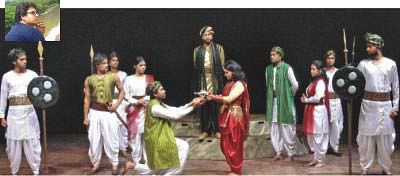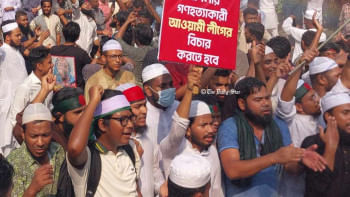“We should try to reach a wider section of the masses”

A scene from Razu's directorial work “Droho Prem Nari”. Photo Courtesy: Prangane Mor
Theatre activities should reach the masses, thinks Ramiz Razu, young actor-director of Prangane Mor. He feels that failing to communicate with the masses remains one of the biggest problems faced by theatre in Bangladesh. According to him, the theatre audience mainly consists of cultural activists, organisers and people from the media.
“The size and class of the audience are major factors. I think we have to communicate with a wider section of the masses. If you come to Shilpakala Academy, you will find many cultural and theatre activists and a significant number of reporters from different TV channels and newspapers. They form the majority of the theatre audience. We have to involve common people in our journey,” he says.
“Among the youngsters, popular pastimes are going to the mall or watching a film at Cineplex. We have to generate interest in theatre among these young people, so that they talk about recent plays and eagerly attend the shows at Shilpakala Academy,” he adds.
Razu's initiation to theatre happened in 1999 through the dance troupe Nataraj. Later in 2004, he joined Prangane Mor as one of the founding members. He has been involved in all six productions of the troupe. Moreover, he directed an adaptation of Kazi Nazrul Islam's “Droho Prem Nari” for his troupe, and directed music for “Shesher Kobita” and “Lal Jamin” (by Shunnon). He performed in all Prangane Mor plays.
Razu finds last year was successful for theatre, as several quality productions had been produced. But as a medium it has not developed significantly, especially when professionalism is concerned, he thinks.
“I'm not sure what the reason behind such failure is. I have to spend a significant period of time each month on theatre. In return, what I achieve always remains as a concern,” he says.
He feels that financial support from the government and media's supportive role can help them reach the goal.
Razu informs that professionalism has been introduced in his troupe since its last production “Shesher Kobita”. The cast and crew have received modest remuneration for each show.
Although he praises the repertory theatre concept as a praiseworthy initiative to introduce professionalism, he thinks it is not the ultimate solution. “Mainstream troupes have to embrace professionalism. There are several troupes that could introduce a wage system for its members,” he says.
Among his contemporary theatre activists, he says, “If you see plays directed by young talents such as Sudip Chakroborthy or Shuvashis Sinha, you will likely admire them. Appreciation comes after watching their works. I think there are several such talents in troupes; they just need opportunities to showcase their abilities,” says Razu.
He feels that senior activists should play more progressive role, and the ambiance of Shilpakala Academy should be more theatre-friendly.

 For all latest news, follow The Daily Star's Google News channel.
For all latest news, follow The Daily Star's Google News channel. 



Comments